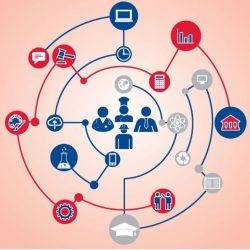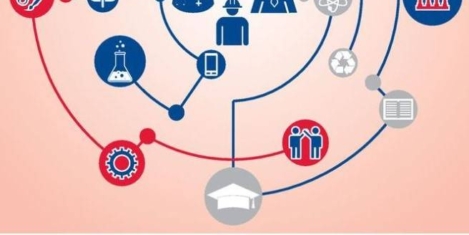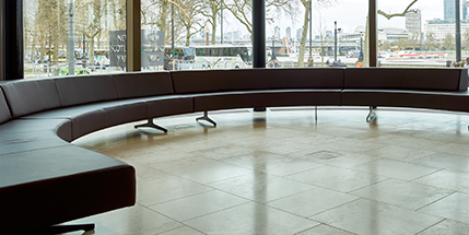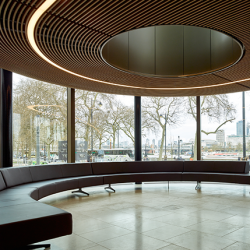November 29, 2017
Boosting skills is the key to improving sluggish growth and productivity
 The United Kingdom has record-high employment levels and very low jobless rates compared to most OECD countries. However, labour productivity growth remains weak and the job prospects of many adults are hurt by their poor literacy and numeracy skills. To boost growth, productivity and earnings, the UK should encourage lifelong learning among adults and promote better skills utilisation, according to a new OECD report. Getting Skills Right: United Kingdom says that educational attainment has been rising in the UK, with 42 percent of adults having a tertiary degree, compared with 34 percent across the OECD. Sixteen per cent graduate in the field of sciences, more than in any other OECD country, and nearly half of science graduates are women. The share of young adults enrolled in vocational education and training has risen to 43 percent but remains lower than in many other European countries. Apprenticeships are also less popular, pursued by around 24 percent of upper secondary students, compared to 59 percent in Switzerland or 41 percent in Germany.
The United Kingdom has record-high employment levels and very low jobless rates compared to most OECD countries. However, labour productivity growth remains weak and the job prospects of many adults are hurt by their poor literacy and numeracy skills. To boost growth, productivity and earnings, the UK should encourage lifelong learning among adults and promote better skills utilisation, according to a new OECD report. Getting Skills Right: United Kingdom says that educational attainment has been rising in the UK, with 42 percent of adults having a tertiary degree, compared with 34 percent across the OECD. Sixteen per cent graduate in the field of sciences, more than in any other OECD country, and nearly half of science graduates are women. The share of young adults enrolled in vocational education and training has risen to 43 percent but remains lower than in many other European countries. Apprenticeships are also less popular, pursued by around 24 percent of upper secondary students, compared to 59 percent in Switzerland or 41 percent in Germany.






 A new survey claims that the ability to accommodate agile working into their life is important, with those who prefer to work agile claiming they would sacrifice an average of 16 percent of their annual salary for the opportunity.In addition to this, 86 percent stated they would even change jobs to accommodate their preference. The report into recruiting for an agile workforce suggests that despite being a relatively new concept, over half surveyed were familiar with it and over 22 percent of those had worked in an agile environment for over two years. However, recruiters claim less than half of the roles they’re working on offer agile, finding it’s most prevalent in the IT sector. The study reveals both recruiters and candidates believe the key attributes for success in agile are being flexible, organised and hardworking. Interestingly, the majority of recruiters believe these are required in advance and cannot be developed on the job. Meanwhile, social qualities (like being introverted or outgoing) or being easy going are less important.
A new survey claims that the ability to accommodate agile working into their life is important, with those who prefer to work agile claiming they would sacrifice an average of 16 percent of their annual salary for the opportunity.In addition to this, 86 percent stated they would even change jobs to accommodate their preference. The report into recruiting for an agile workforce suggests that despite being a relatively new concept, over half surveyed were familiar with it and over 22 percent of those had worked in an agile environment for over two years. However, recruiters claim less than half of the roles they’re working on offer agile, finding it’s most prevalent in the IT sector. The study reveals both recruiters and candidates believe the key attributes for success in agile are being flexible, organised and hardworking. Interestingly, the majority of recruiters believe these are required in advance and cannot be developed on the job. Meanwhile, social qualities (like being introverted or outgoing) or being easy going are less important.








 UK workers are still uncomfortable about having honest conversations at work, with nearly two thirds (61 percent) feel they keep an aspect of their lives hidden in the workplace. The research from Inclusive Employers found family difficulties (46 percent) was the most likely hidden issue at work, followed by mental health (31 percent). One in five also admitted they would hide their sexual orientation while at work. It also found a generational divide, with 67 percent of employees aged between 18 -24 years old keeping something secret compared to 55 percent of those over aged 55 years or over. The data, released to mark National Inclusion Week 2017, found this lack of openness can have negative impacts on workers and employers, with over a quarter of workers (26 percent) admitting they would feel less connected to their workplace if they hid an aspect of themselves and 18 percent saying their performance would suffer.
UK workers are still uncomfortable about having honest conversations at work, with nearly two thirds (61 percent) feel they keep an aspect of their lives hidden in the workplace. The research from Inclusive Employers found family difficulties (46 percent) was the most likely hidden issue at work, followed by mental health (31 percent). One in five also admitted they would hide their sexual orientation while at work. It also found a generational divide, with 67 percent of employees aged between 18 -24 years old keeping something secret compared to 55 percent of those over aged 55 years or over. The data, released to mark National Inclusion Week 2017, found this lack of openness can have negative impacts on workers and employers, with over a quarter of workers (26 percent) admitting they would feel less connected to their workplace if they hid an aspect of themselves and 18 percent saying their performance would suffer.















December 4, 2017
There is no clash of the digital and analogue worlds
by Steve Brewer • Comment, Technology, Workplace design
More →